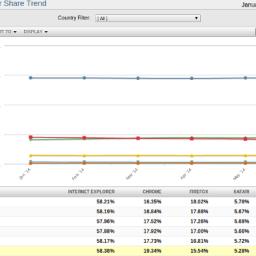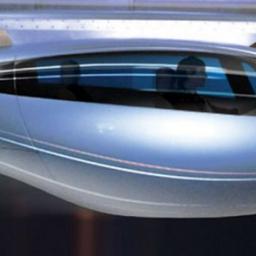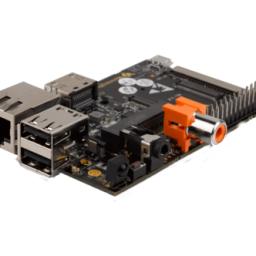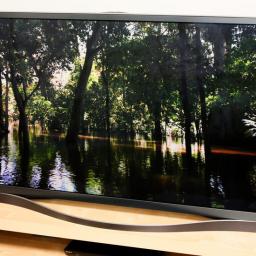
Bad news for the little browser that could: not only is Firefox no longer a "little browser" but it is increasingly having trouble competing. Back in 2009, Firefox was on the rise. But now, not only is Chrome eating its lunch but Firefox's user share is actually slipping.
Netmarketshare provides the data and
SJVN provides the analysis/funeral rites. He suggests:
For Firefox to remain a web browser power, it needs to make big improvements and it needs to make them now. Otherwise, Firefox may yet follow its predecessor Netscape into the web's past.
[ed. note: as a steadfast Opera user since 2000, this is all fascinating. Opera seems pegged-for-life at 3%]
Seems like 80% of the world's scientists are working diligently on designing the newest smart-watch or cellphone. Boring! This poll asks:
where should we be investing our time and energy? Understanding that to a degree, there is overlap in disciplines (better waste disposal could easily lead to progress in energy production, for example), where should we be investing our time and energy for maximum human impact?
This is a borda poll, so give "1" to your first preference and "6" to the field you prefer the least, etc., and we'll see which fields float to the top.
Yes, everyone is angry that Facebook
manipulated 700,000 users' timelines to see if they could help researchers prove emotions are contagious. But John Foreman isn't just annoyed about it.
As a data scientist, he's thought deeply about where this is headed, and it's not good. He brings up the
Kuleshov Effect first described by a Russian scientist, that images matter less than the sequence in which they are stitched together. And he concludes:
In this particular study in PNAS, we can see that the promise of data modeling at Facebook is not to "let humans be more human." It's not to "free their minds."
All of that machine reasoning isn't trying to make us more human so much as it is trying to make us more sad and predictable. And just wait until deep learning applied to image recognition can recognize and stream my selfie at Krispie Kreme next to a tagged photo of me and my love handles at the beach. Data-driven inferiority complexes for all!
The promise of data modeling at Facebook is to place us in chains made from the juxtaposition of our own content. We'll be driven into pens made of a few profitable emotional states where marketing content waits for us like a cattle gun to the skull.
This is an interesting read. Not surprising, but disappointing nonetheless. Time to ditch Facebook and spend more time on Twitter? He's got thoughts about that too.

Ever wish you could be transported across town at 250 kilometers per hour via magnetic transport tech? Get your butt over to Tel Aviv, Israel, then.
According to the guys over at PanicaTech, Israel is getting ready to build the world's first ultra-modern transport system. From the article:
Company SkyTran, based at the National Research Center NASA Ames in California (USA), is going to create in Tel Aviv, the world's first high-speed rail transportation system-Maglev. Each "composition" will be designed for two people. At the moment, together with engineers from SkyTran NASA engaged in manufacturing the necessary elements, structures and capsules, which will then be sent to Israel for further installation of the transport network.
Initially, before the end of 2015 it is planned to construct a circular branch length of only about 400 meters. To test. If all goes well, then Tel Aviv will become the first city in the world, which will be installed full futuristic public transport system Maglev.
[Ed. note: yes, but can you drink a coffee at that speed?]
The New York Times has just published a blistering review of BuzzFeed. Yes, BuzzFeed is maddening and crazy and frenetic and vaguely unnerving, but the NYT nails it:
The site knows that successful diversion depends on continually toggling its joystick between micronostalgia for the past ("55 Things Only '90s Teenage Girls Can Understand") and microexaminations of the latest microtrend ("The 'Gingers Have Souls' Kid Just Released a Hip-Hop Music Video"). BuzzFeed will simultaneously pretend that joy is an ever-renewable resource ("13 Cute Kid Vines You'll Watch Over and Over Again") while also hinting that our stores of happiness are dangerously low and dwindling ("13 Holidays You've Been Celebrating Totally Wrong"). ...
In fact, the more time you spend on BuzzFeed, the more the boundaries between "win" and "fail" seem to blur. After a while, it's impossible not to slip into a disassociative trance, in which you surrender to the allure of some perpetual, trivial nowhereland, nestled somewhere between "15 Cats That You Don't Want to Mess With" and the "44 Hong Kong Movie Subtitles Gone Wrong."
Have a look at the Onion parody they reference, too: it's awesome. But that brings up an interesting question: we've got Facebook's Timeline (which we now know is manipulated), Reddit, various sites like this one, and dozens of big and small sites trying to be the first and fastest to spot or create trends, broach news subjects, or get people talking (and viewing advertisements). Is this as far as we're going to go? What's the next step? Are sites like Slashdot old news? Is the BuzzFeed frenzy ultimately unsustainable? Is it "32 news sites you should be reading daily"?

Probably time to admit I'm addicted to these awesome little gadget boards and devices.
And I just discovered this one: the HummingBoard.
Get ready to fall in love with new HummingBoard - a small and powerful, low-cost ARM computer that ignites the imagination. Whatever your dream, the HummingBoard will help make it happen - the possibilities for creating the next great IoT innovation are truly limitless. The HummingBoard allows you to run many open source operating systems - such as Ubuntu, Debian and Arch - as well as Android and XBMC. With its core technology based on SolidRun's state-of-the-art Micro System on a Module (MicroSOM), it has ready-to-use OS images, and its open hardware comes with full schematics and layout. Best of all, as a Linux single board computer, the HummingBoard is backed by the global digital maker community, which means you can alter the product in any way you like and get full kernel upstreaming support and all the assistance you need.
The big, obvious advantage is that the USB hub is powered, which would allow you to connect it to an external hard drive full of your data, something that's kind of a hassle with the Raspberry Pi (well, not a
huge hassle, but an extra step).
 Samsung has announced they'll be discontinuing production of Plasma televisions
Samsung has announced they'll be discontinuing production of Plasma televisions, citing lack of demand. Panasonic has already quit, and it seems LG is about to do the same. Samsung has declared:
"We plan to continue our PDP TV business until the end of this year, due to changes in market demands. We remain committed to providing consumers with products that meet their needs, and will increase our focus on growth opportunities in UHD TV's and Curved TV's."
But wait, what about me? How am I supposed to
watch all those great shows now?

Like it or hate it,
Google's Streetview map interface exists and is used every day by all sorts of people. Getting to the point of a usable map interface wasn't easy.
Here are some war stories from the trenches by Iain McClatchie, who participated in the effort.
We didn't know it at the time, but the problems we were having were essentially due to the high resolution we were trying to shoot. High resolution from a moving platform leads to short exposure times. Short exposure times require large relative apertures to get enough sensitivity. Compared to small format cameras, our focal lengths were fairly long (28 mm, IIRC), so that meant much larger apertures, much larger photocurrents, and thus the problems we were fighting. In hindsight, the two real solutions were lower resolution or CMOS sensors. Rather than try those, I tried to make the high resolution CCD work with shutters (the R3 camera) and choppers (R4).
It's a pretty amazing project and must have been an awesome time to be in on the fun.

American like to talk about progress and technological innovation, but they (we) get pretty quiet when it comes to our cars. Most American cities are increasingly nightmarish urban centers, choked with car traffic and foul with all the worst impacts of a society that has chosen the freedom of individual, automotive transportation and eschewed public transport in most of its forms. Everybody wants "reform" but few are actually doing it with much success.
Enter Denver, Colorado. From CityLab:But in a state that recently voted to legalize the retail sale of marijuana, change is clearly in the wind. Ten years ago, Denver's new mayor (and current Colorado governor) John Hickenlooper began to ramp up a campaign to convince voters to approve an ambitious expansion of the region's embryonic light rail network. A similar plan - fuzzy on such key details as routes and cost - had been defeated in a 1997 referendum. In 2004, the region's voters approved $4.7 billion of new debt for the FasTracks program. The plan, to add 121 miles of new commuter and light-rail tracks to the region, 18 miles of bus rapid transit lanes, 57 new rapid transit stations, and 21,000 park-and-ride spots, was approved 58-to-42, precisely reversing the results of the '97 referendum. (The pricetag has since risen to $7.8 billion.)
By building a multi-poled system, RTD is tailoring transit to the contemporary metropolis. Crucially, by building it in conjunction with high-density transit-oriented development, the agency is also scheming to change the very nature of the American metropolis. That's why, when it comes to the future of transportation on this continent, Denver may be the city to watch.
 Bad news for the little browser that could: not only is Firefox no longer a "little browser" but it is increasingly having trouble competing. Back in 2009, Firefox was on the rise. But now, not only is Chrome eating its lunch but Firefox's user share is actually slipping. Netmarketshare provides the data and SJVN provides the analysis/funeral rites. He suggests:
Bad news for the little browser that could: not only is Firefox no longer a "little browser" but it is increasingly having trouble competing. Back in 2009, Firefox was on the rise. But now, not only is Chrome eating its lunch but Firefox's user share is actually slipping. Netmarketshare provides the data and SJVN provides the analysis/funeral rites. He suggests:



